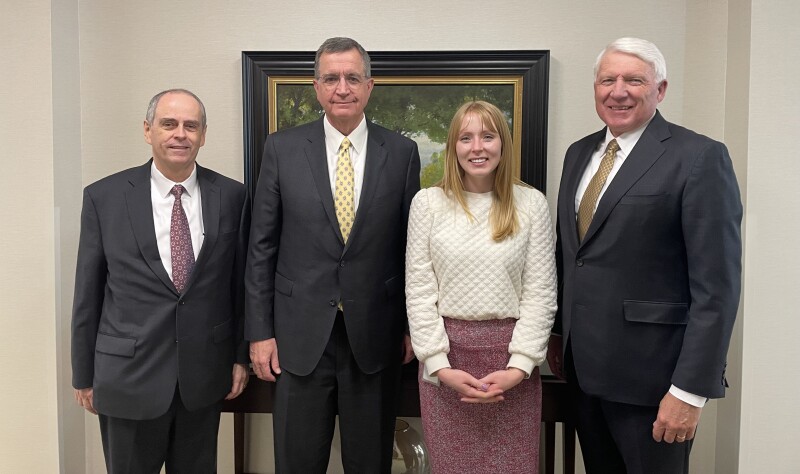After getting married in May, my husband and I moved into a new ward. I’d had a wonderful time for the last seven years in Young Single Adults wards, but now I was excited at the possibility of being called to serve in Primary or with Young Women.
I love children and teenagers and figured a calling in one of those organizations made sense for my stage of life as a young newlywed.
So I was quite surprised when shortly after we moved in, I was called to teach Gospel Doctrine, and my husband was called into the Sunday School presidency. I do love to teach and was excited, but also aware that I would most likely be the youngest person in the room each time I taught the lesson. Why not call someone older?
But the members of our new ward are kind, and I trusted the bishop’s inspiration, so I jumped into the calling and have been teaching for several months now. It’s been a great experience and made me think more deeply about how to be an effective teacher, both at home and at church.
So when an opportunity arose for someone from LDS Living to interview the Sunday School General Presidency to discuss the new Come, Follow Me year, I was eager to be the one to go.
And the conversation more than met my expectations. President Mark L. Pace and his two counselors, Brothers Milton Camargo and Jan E. Newman, are leaders who radiate kindness and dedication.
They made me feel at ease on the 24th floor of the Church Office Building right away. And they wasted no time, quickly jumping into sharing their experiences and perspectives with Come, Follow Me.
President Pace first told me they have a “very simple calling.” President Russell M. Nelson has asked the presidency to work on two things:
- Getting the scriptures deeper into the hearts and souls of the Saints.
- Improving gospel teaching.
As the conversation progressed, President Pace said something about teaching that surprised me and was my biggest “ah-ha” moment of the interview:
“If the members of my class walked out being motivated and encouraged to study the scriptures at home, that’s the best thing I can possibly do as a teacher,” President Pace said.
Brother Newman built on that comment by sharing an interesting question he says he often poses to teachers:
“What would you do differently than you’ve ever done before to encourage [your class or family] to study? Most teachers don’t think that way. They just think about what they’re going to teach. But [to think] what can I do to inspire the learners in my class to be more diligent in their own personal study? That’s a little bit of a paradigm shift for teachers,” he says.
What would you do differently than you’ve ever done before to encourage [your class or family] to study?
I can say that this Sunday School teacher had not thought about that question before.
To explain further, President Pace picked up a set of scriptures from off the table and turned to Doctrine and Covenants 50. He read verses 17 and 18 which teach us that if someone is going to preach the truth, they must do it by the Spirit of truth otherwise it is not of God. While many Latter-day Saints are familiar with that concept, we may need a reminder of the truth from verses 19 and 20: that those listening to the truth must also receive it by the Spirit or it is not of God.
“I used to think that I could just go to class and sit down and that you would stand up and teach me, and you would just pour it into me,” President Pace says. “I didn’t need to study for the lesson because I’m not the teacher. All the preparation was going to be done by the teacher, I just went there and sat there. But the Lord understood: … those of us that are in the class have to have the Spirit.”
President Pace is encouraged by the response they have seen in Church members throughout the world in response to Come, Follow Me. Both surveys and data from the Gospel Library App show that Latter-day Saints are studying more than they ever have in the past.
“We feel we’ve seen the change in the teaching in the Church as the teacher and the receiver both have been studying during the week. Both have had spiritual experiences. Both have qualified to have the Spirit with them in the teaching experience, and they rejoice and are edified together,” he says, referencing Doctrine and Covenants 50:22. “The fact that the Saints are studying the scriptures at home, makes the teaching experience really a lot better, and we’re really grateful.”

It’s a beautifully simple focus for teachers—how can I help the people in my class be excited to read the scriptures on their own?
The presidency suggested a simple way to help us get started: at the beginning of the class, take a few minutes to ask class members what the Holy Ghost taught them that week from the scriptures.
“If you consistently do that, it becomes a culture of the class that [the teacher is] just as interested in what you’re learning as what [they’re] going to teach,” Brother Newman says. “And then everybody’s going, ‘Well, I need to study this at home, because I’ve heard some great things from the other members, and I would really like to participate in that.’”
At this point, I spoke up to say that while I agreed with their idea, I know I’m not the only teacher who has asked my class what they’ve learned and been greeted by chirping crickets. President Pace once again surprised me with his response:
“Just because everybody didn’t answer didn’t mean they didn’t think about it. And that didn’t mean they didn’t have an experience. And it didn’t mean that you didn’t validate their own personal experience,” he says.
Just because everybody didn’t answer didn’t mean they didn’t think about it.
Brother Camargo then added a poignant comment I am going to keep in mind:
“I think we are going in that direction of having more [people] than ever studying at home, but it is still not perfect. We know that a large number of members don’t do that. At home maybe they are alone, maybe they don’t have a family, and they are not used to [studying],” he says.
“So I still see the role of the teacher as quite important. And my concern is that we don’t move the pendulum so much to the [other] side that then the teacher sometimes thinks, ‘Oh, I just ask a question. And that’s it, they take over.’ … I think it is important that teachers are teachers. They received an assignment, they have been set apart, and they receive inspiration. They have to engage the members, and they have to understand that they’re there to represent the Master Teacher.”
President Pace then looked me right in the eyes as he re-emphasizes Brother Camargo’s point, and I felt chills as he taught me the role of a teacher:
“We’re not talking about a free-for-all for 50 minutes, where [a teacher] says, ‘Oh, it’s the greatest thing, all I do is ask a question. And then people just talk, we go back and forth, and 50 minutes is done. It’s just been great.’ Except that you’ve been called to teach! And you’ve had hands laid on your head and you’ve been given the power and authority of your calling,” he says.
You’ve been called to teach! And you’ve had hands laid on your head and you’ve been given the power and authority of your calling.
“So we want to encourage [members] in their own experience at home … then say, ‘These are all wonderful. Thank you for your comments, and we know many of you are having a wonderful experience in the scriptures and we rejoice in that. Let’s talk about something that I was thinking would be important for us to study.’ Then you take charge of your class, and you start moving forward.”
To some, my calling to teach 15–20 adults a 50-minute lesson once a month may not seem like a big deal. And sometimes I even downplay the potential I have to help others come unto Christ as a Sunday School teacher and as a teacher in my home.
But my conversation with the Sunday School general presidency reminded me that my service as a teacher can do a lot of good. I feel excited, honored even, to teach. We all have roles to fill in God’s kingdom, and right now, I am very grateful that one of mine is teacher.
▶ You may also like: Sariah shows us how to answer the delicate question: What if I don’t ‘know’?


